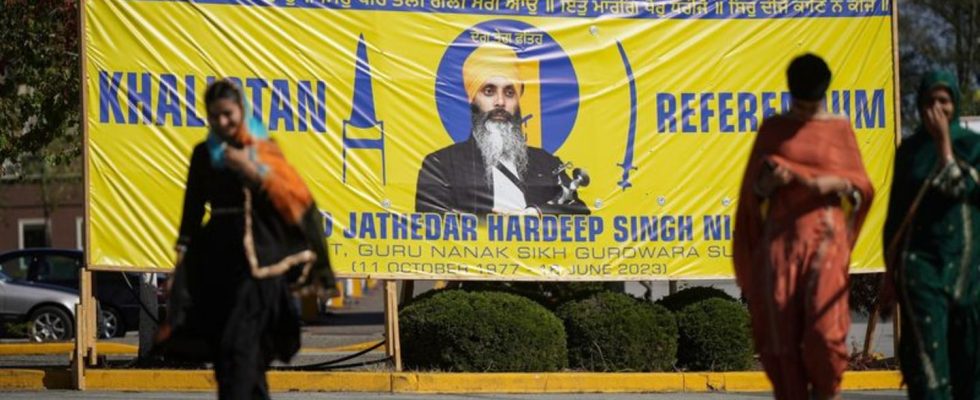diplomacy
Mysterious murder: Nijjar case divides Canada and India
A banner with the image of the slain Hardeep Singh Nijjar is displayed in front of a Sikh cultural center in Surrey, Canada. The case strains the relationship between Canada and India. photo
© DARRYL DYCK/The Canadian Press/AP/dpa
A religious activist in Canada is labeled a “terrorist” by the Indian government – and one day he is shot dead by unknown assailants. The murder of Hardeep Singh Nijjar is not only causing tensions between Ottawa and New Delhi.
Hardeep Singh Nijjar was standing in front of a temple on a June evening this year when two masked men opened fire on him. The police in Surrey, western Canada, near the metropolis of Vancouver, arrived in front of the Sikh church shortly after 8:30 p.m. They found the 45-year-old in his car with gunshot wounds. A short time later, the religious activist was dead.
What some in Nijjar’s community already suspected at the time received new fuel and international attention on Monday when Canadian Prime Minister Justin Trudeau addressed Parliament Ottawa stepped in and linked Indian government agents to the case.
New Delhi described Nijjar as a dangerous terrorist
“In recent weeks, Canadian security agencies have been actively pursuing credible allegations of a possible link between Indian government agents and the murder of Canadian citizen Hardeep Singh Nijjar,” Trudeau said. Serious allegations that the Indian government promptly rejected. But they didn’t come as a complete surprise, because the leadership in New Delhi never made a secret of the fact that they considered the Indian-born Nijjar to be a dangerous terrorist.
The reason for this is that the man from the Sikh religious community – which has the largest community outside India with almost 800,000 followers in Canada – belonged to the so-called Khalistan movement. This advocates for an independent country on the territory of India. Indian authorities had long accused him of being involved in several killings and financing separatist activities.
According to the allegations, he is also the leader of the militant group called the Khalistan Tiger Force (KTF). However, there were never any charges in Canada. Nijjar’s supporters assert that he worked exclusively peacefully for his goals.
India demands extradition of alleged suspects
Most recently, according to media reports, Nijjar, who headed the community in Surrey as president and had a Canadian passport for many years, worked on a referendum, the result of which has no binding effect. All Sikhs in the Canadian region of British Columbia should be able to vote on whether or not they want their own state on Indian territory. What is technically a constitutional act for the Canadian authorities was a thorn in India’s side.
The relationship with Ottawa had long suffered because of the Khalistan movement. New Delhi accuses Canada of offering protection to separatists and doing little to protect Indian embassies and consulates from attacks by such groups – but there are no major incidents of this kind, at least publicly known. In the last few days, India initially suspended issuing visas to Canadians and justified this with security concerns.
An Indian Foreign Ministry spokesman demanded on Thursday: “We want the Canadian government to not harbor terrorists and take action against those accused of terrorism and send them here to face trial.” At least 20 extradition requests to Canada have remained unanswered in the past.
Nothing to fear? India’s geopolitical importance is growing
The Nijjar case led to a low point in relations between the two democracies. Both countries expelled each other’s diplomats. Canada sees nothing less than a violation of its sovereignty in the face of Indian intelligence agents allegedly operating on its territory. It seems certain that Canada would not make its allegations without clear references to Indian intelligence.
Normally, cases of this kind result in an outcry among the allies of the affected countries. Not so with Nijjar: Washington is also conspicuously reluctant to join in with the allegations and put pressure on the Indian government. Concern is simply expressed and a warning is given to deal with it.
According to observers, India is benefiting from its increasingly important geopolitical role here: especially in the Indo-Pacific, India, with its around 1.4 billion inhabitants, plays an important role as a counterweight to China in the strategy of the USA and its Western partners. US President Joe Biden recently courted Indian Prime Minister Narendra Modi during a pompous state visit to Washington. India, it seems, is currently enjoying particular goodwill among its partners – this could also encourage Modi on the issue of human rights violations, for example.
On Friday, the focus in Ottawa was actually on another conflict: the one in Ukraine. But even during President Volodymyr Zelensky’s sensational visit, Trudeau is not left unmoved by Niyjar’s murder. What does Trudeau say about the allegations from India that Canada has not shared details with New Delhi? The prime minister replied that attempts had been made to talk to the Indians for weeks: “We hope that they will work with us so that we can get to the bottom of this very serious matter.”

